Case Study Analysis: Aboriginal Health Determinants and Policies
VerifiedAdded on 2023/06/10
|7
|1487
|460
Case Study
AI Summary
This case study examines the health of a 16-year-old Aboriginal teenager named Joanna, who is pregnant and has left her home. The analysis focuses on the social determinants of health, including home environment and economic stability, and how they affect her well-being. It explores the impact of historical policies like the Assimilation policy on Aboriginal health and the effects of institutional racism on access to healthcare. The study also applies the Health Belief Model to understand Joanna's decisions and the role of cultural safety in her choice of healthcare provider. The case highlights the importance of culturally safe care, the impact of colonization, and the need to address trauma, grief, and loss within the Aboriginal community to improve health outcomes. The study references several academic sources to support its findings.
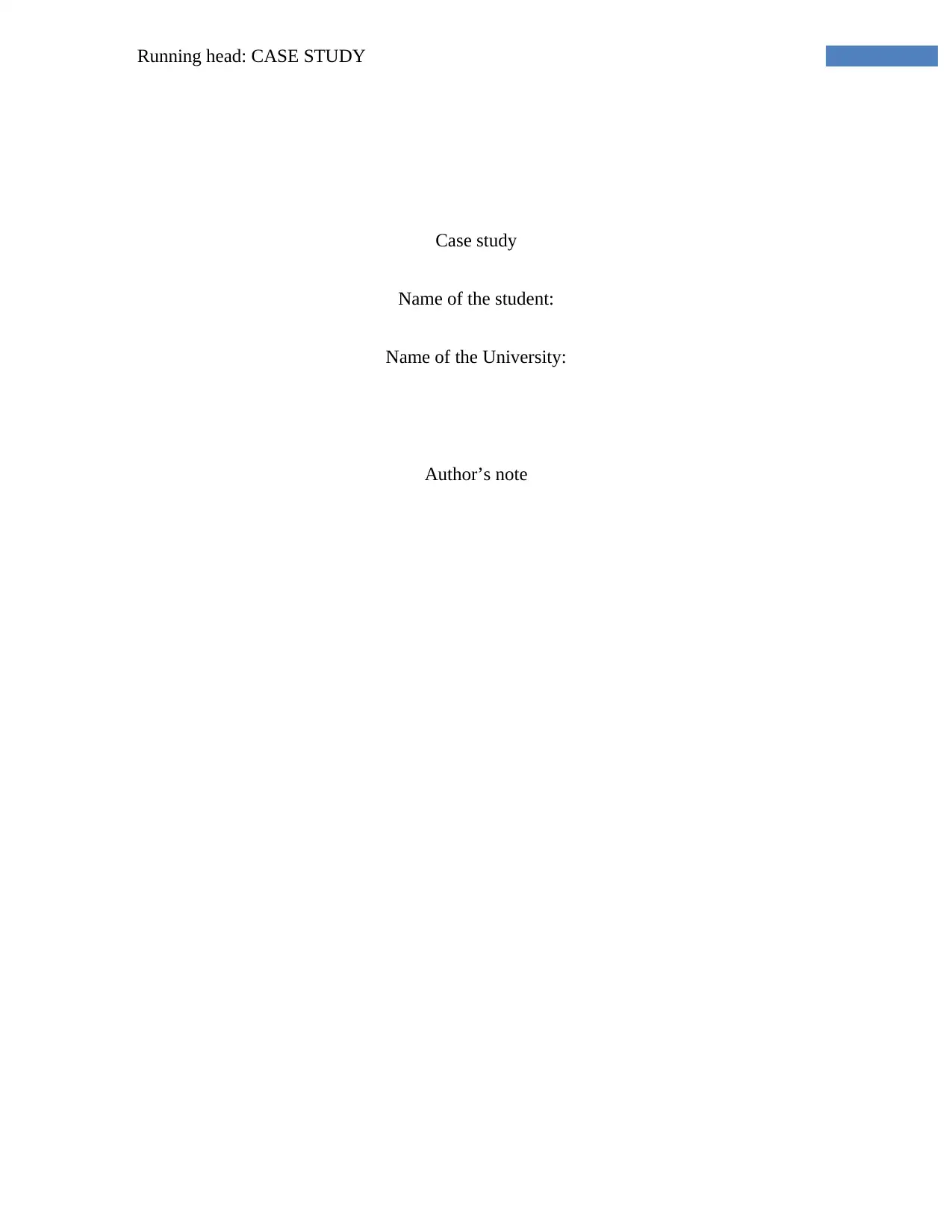
Running head: CASE STUDY
Case study
Name of the student:
Name of the University:
Author’s note
Case study
Name of the student:
Name of the University:
Author’s note
Paraphrase This Document
Need a fresh take? Get an instant paraphrase of this document with our AI Paraphraser
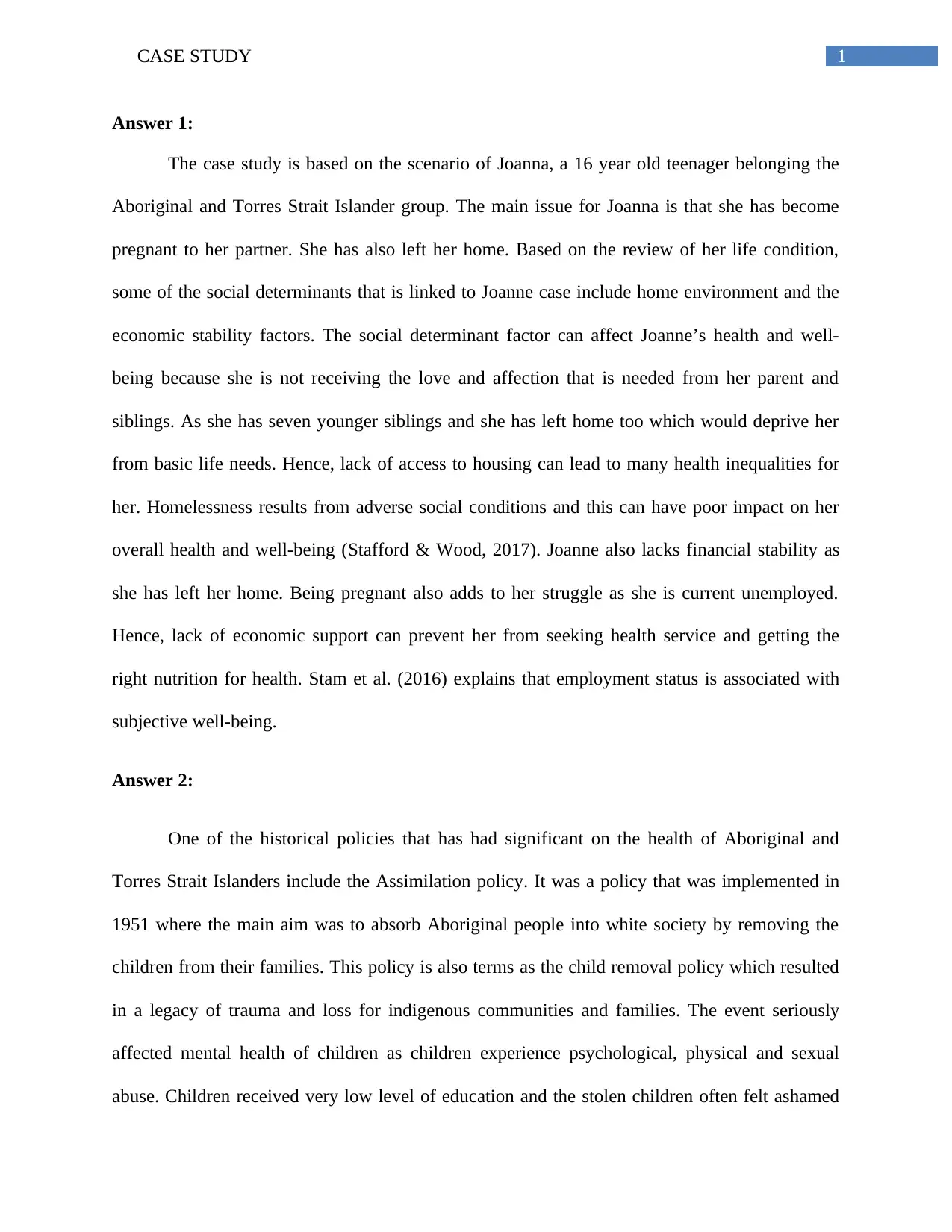
1CASE STUDY
Answer 1:
The case study is based on the scenario of Joanna, a 16 year old teenager belonging the
Aboriginal and Torres Strait Islander group. The main issue for Joanna is that she has become
pregnant to her partner. She has also left her home. Based on the review of her life condition,
some of the social determinants that is linked to Joanne case include home environment and the
economic stability factors. The social determinant factor can affect Joanne’s health and well-
being because she is not receiving the love and affection that is needed from her parent and
siblings. As she has seven younger siblings and she has left home too which would deprive her
from basic life needs. Hence, lack of access to housing can lead to many health inequalities for
her. Homelessness results from adverse social conditions and this can have poor impact on her
overall health and well-being (Stafford & Wood, 2017). Joanne also lacks financial stability as
she has left her home. Being pregnant also adds to her struggle as she is current unemployed.
Hence, lack of economic support can prevent her from seeking health service and getting the
right nutrition for health. Stam et al. (2016) explains that employment status is associated with
subjective well-being.
Answer 2:
One of the historical policies that has had significant on the health of Aboriginal and
Torres Strait Islanders include the Assimilation policy. It was a policy that was implemented in
1951 where the main aim was to absorb Aboriginal people into white society by removing the
children from their families. This policy is also terms as the child removal policy which resulted
in a legacy of trauma and loss for indigenous communities and families. The event seriously
affected mental health of children as children experience psychological, physical and sexual
abuse. Children received very low level of education and the stolen children often felt ashamed
Answer 1:
The case study is based on the scenario of Joanna, a 16 year old teenager belonging the
Aboriginal and Torres Strait Islander group. The main issue for Joanna is that she has become
pregnant to her partner. She has also left her home. Based on the review of her life condition,
some of the social determinants that is linked to Joanne case include home environment and the
economic stability factors. The social determinant factor can affect Joanne’s health and well-
being because she is not receiving the love and affection that is needed from her parent and
siblings. As she has seven younger siblings and she has left home too which would deprive her
from basic life needs. Hence, lack of access to housing can lead to many health inequalities for
her. Homelessness results from adverse social conditions and this can have poor impact on her
overall health and well-being (Stafford & Wood, 2017). Joanne also lacks financial stability as
she has left her home. Being pregnant also adds to her struggle as she is current unemployed.
Hence, lack of economic support can prevent her from seeking health service and getting the
right nutrition for health. Stam et al. (2016) explains that employment status is associated with
subjective well-being.
Answer 2:
One of the historical policies that has had significant on the health of Aboriginal and
Torres Strait Islanders include the Assimilation policy. It was a policy that was implemented in
1951 where the main aim was to absorb Aboriginal people into white society by removing the
children from their families. This policy is also terms as the child removal policy which resulted
in a legacy of trauma and loss for indigenous communities and families. The event seriously
affected mental health of children as children experience psychological, physical and sexual
abuse. Children received very low level of education and the stolen children often felt ashamed
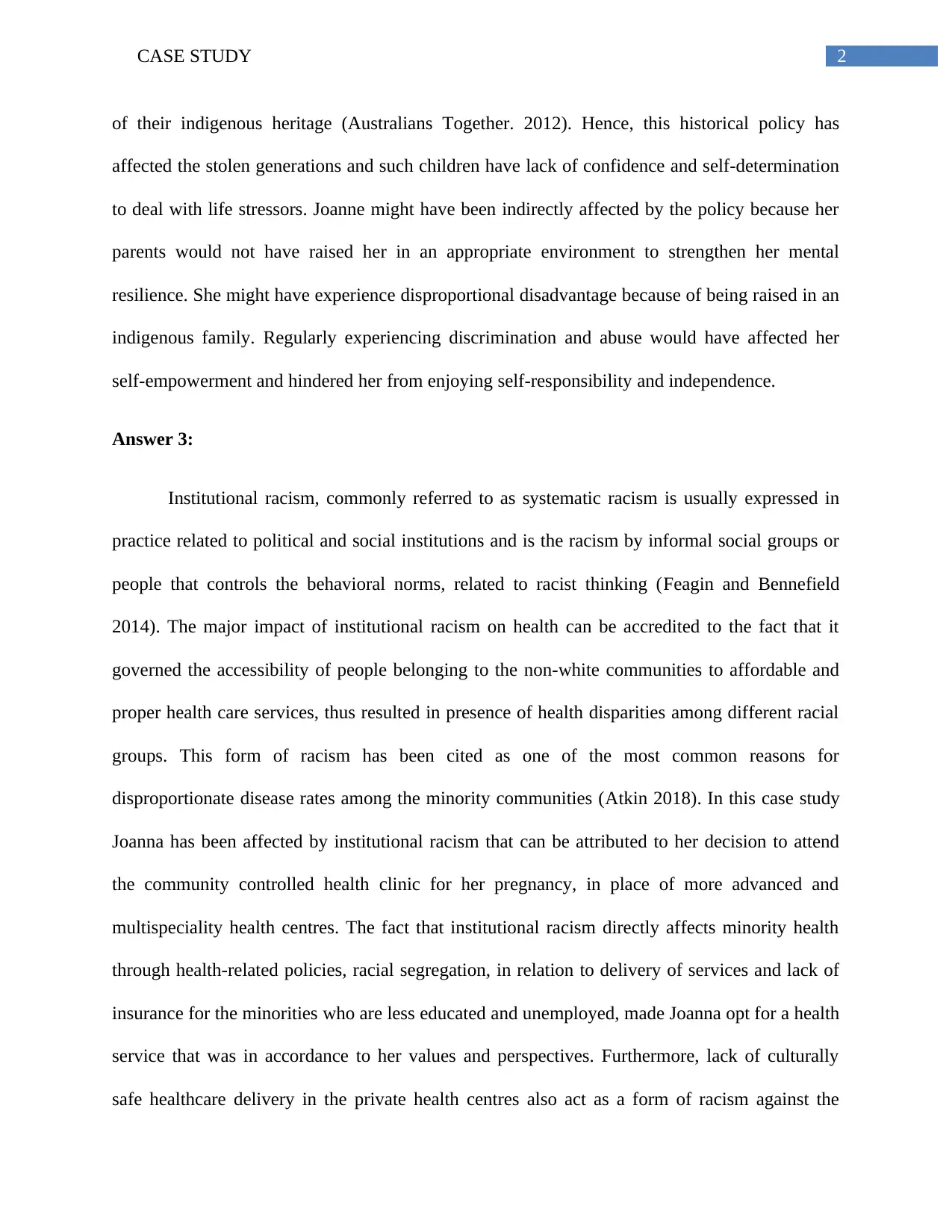
2CASE STUDY
of their indigenous heritage (Australians Together. 2012). Hence, this historical policy has
affected the stolen generations and such children have lack of confidence and self-determination
to deal with life stressors. Joanne might have been indirectly affected by the policy because her
parents would not have raised her in an appropriate environment to strengthen her mental
resilience. She might have experience disproportional disadvantage because of being raised in an
indigenous family. Regularly experiencing discrimination and abuse would have affected her
self-empowerment and hindered her from enjoying self-responsibility and independence.
Answer 3:
Institutional racism, commonly referred to as systematic racism is usually expressed in
practice related to political and social institutions and is the racism by informal social groups or
people that controls the behavioral norms, related to racist thinking (Feagin and Bennefield
2014). The major impact of institutional racism on health can be accredited to the fact that it
governed the accessibility of people belonging to the non-white communities to affordable and
proper health care services, thus resulted in presence of health disparities among different racial
groups. This form of racism has been cited as one of the most common reasons for
disproportionate disease rates among the minority communities (Atkin 2018). In this case study
Joanna has been affected by institutional racism that can be attributed to her decision to attend
the community controlled health clinic for her pregnancy, in place of more advanced and
multispeciality health centres. The fact that institutional racism directly affects minority health
through health-related policies, racial segregation, in relation to delivery of services and lack of
insurance for the minorities who are less educated and unemployed, made Joanna opt for a health
service that was in accordance to her values and perspectives. Furthermore, lack of culturally
safe healthcare delivery in the private health centres also act as a form of racism against the
of their indigenous heritage (Australians Together. 2012). Hence, this historical policy has
affected the stolen generations and such children have lack of confidence and self-determination
to deal with life stressors. Joanne might have been indirectly affected by the policy because her
parents would not have raised her in an appropriate environment to strengthen her mental
resilience. She might have experience disproportional disadvantage because of being raised in an
indigenous family. Regularly experiencing discrimination and abuse would have affected her
self-empowerment and hindered her from enjoying self-responsibility and independence.
Answer 3:
Institutional racism, commonly referred to as systematic racism is usually expressed in
practice related to political and social institutions and is the racism by informal social groups or
people that controls the behavioral norms, related to racist thinking (Feagin and Bennefield
2014). The major impact of institutional racism on health can be accredited to the fact that it
governed the accessibility of people belonging to the non-white communities to affordable and
proper health care services, thus resulted in presence of health disparities among different racial
groups. This form of racism has been cited as one of the most common reasons for
disproportionate disease rates among the minority communities (Atkin 2018). In this case study
Joanna has been affected by institutional racism that can be attributed to her decision to attend
the community controlled health clinic for her pregnancy, in place of more advanced and
multispeciality health centres. The fact that institutional racism directly affects minority health
through health-related policies, racial segregation, in relation to delivery of services and lack of
insurance for the minorities who are less educated and unemployed, made Joanna opt for a health
service that was in accordance to her values and perspectives. Furthermore, lack of culturally
safe healthcare delivery in the private health centres also act as a form of racism against the
⊘ This is a preview!⊘
Do you want full access?
Subscribe today to unlock all pages.

Trusted by 1+ million students worldwide
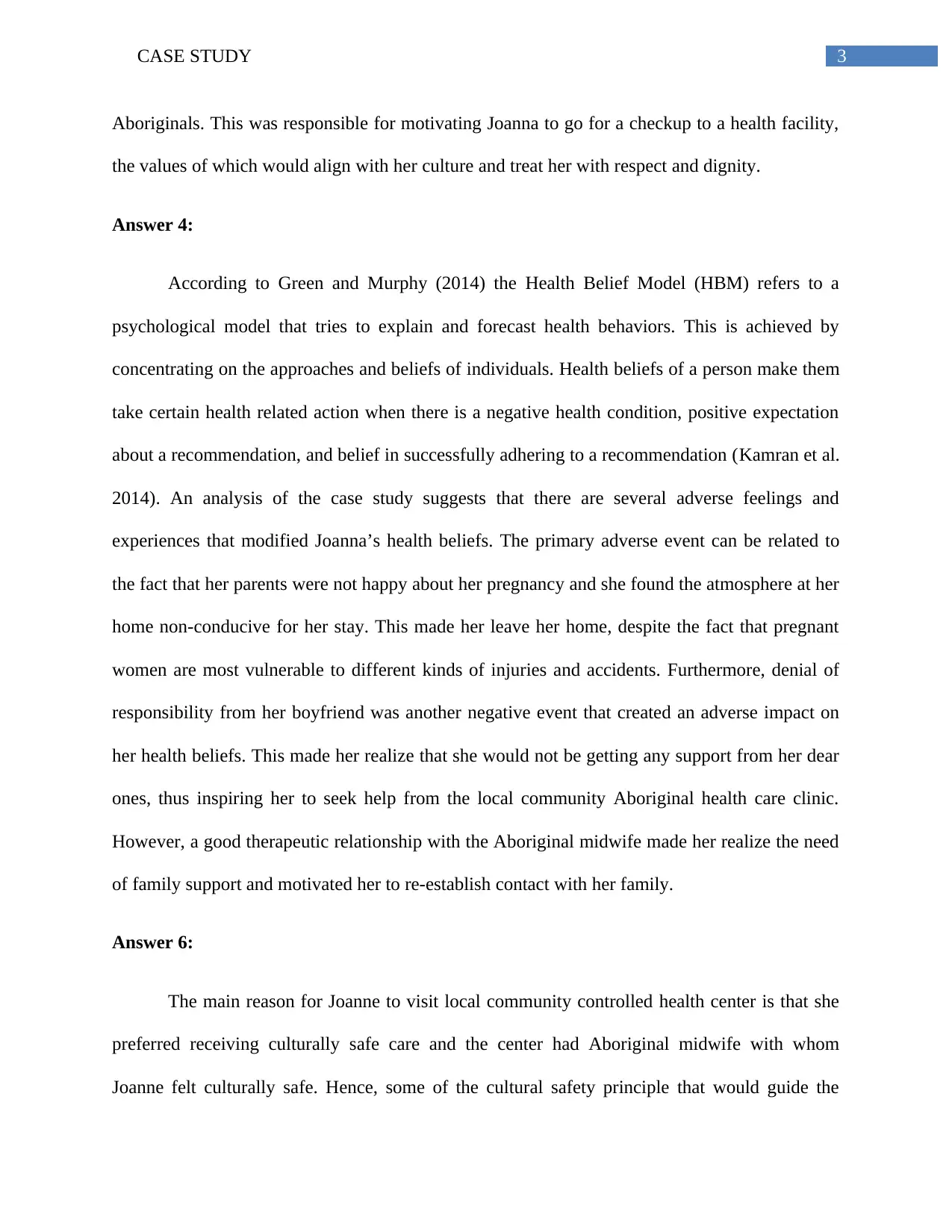
3CASE STUDY
Aboriginals. This was responsible for motivating Joanna to go for a checkup to a health facility,
the values of which would align with her culture and treat her with respect and dignity.
Answer 4:
According to Green and Murphy (2014) the Health Belief Model (HBM) refers to a
psychological model that tries to explain and forecast health behaviors. This is achieved by
concentrating on the approaches and beliefs of individuals. Health beliefs of a person make them
take certain health related action when there is a negative health condition, positive expectation
about a recommendation, and belief in successfully adhering to a recommendation (Kamran et al.
2014). An analysis of the case study suggests that there are several adverse feelings and
experiences that modified Joanna’s health beliefs. The primary adverse event can be related to
the fact that her parents were not happy about her pregnancy and she found the atmosphere at her
home non-conducive for her stay. This made her leave her home, despite the fact that pregnant
women are most vulnerable to different kinds of injuries and accidents. Furthermore, denial of
responsibility from her boyfriend was another negative event that created an adverse impact on
her health beliefs. This made her realize that she would not be getting any support from her dear
ones, thus inspiring her to seek help from the local community Aboriginal health care clinic.
However, a good therapeutic relationship with the Aboriginal midwife made her realize the need
of family support and motivated her to re-establish contact with her family.
Answer 6:
The main reason for Joanne to visit local community controlled health center is that she
preferred receiving culturally safe care and the center had Aboriginal midwife with whom
Joanne felt culturally safe. Hence, some of the cultural safety principle that would guide the
Aboriginals. This was responsible for motivating Joanna to go for a checkup to a health facility,
the values of which would align with her culture and treat her with respect and dignity.
Answer 4:
According to Green and Murphy (2014) the Health Belief Model (HBM) refers to a
psychological model that tries to explain and forecast health behaviors. This is achieved by
concentrating on the approaches and beliefs of individuals. Health beliefs of a person make them
take certain health related action when there is a negative health condition, positive expectation
about a recommendation, and belief in successfully adhering to a recommendation (Kamran et al.
2014). An analysis of the case study suggests that there are several adverse feelings and
experiences that modified Joanna’s health beliefs. The primary adverse event can be related to
the fact that her parents were not happy about her pregnancy and she found the atmosphere at her
home non-conducive for her stay. This made her leave her home, despite the fact that pregnant
women are most vulnerable to different kinds of injuries and accidents. Furthermore, denial of
responsibility from her boyfriend was another negative event that created an adverse impact on
her health beliefs. This made her realize that she would not be getting any support from her dear
ones, thus inspiring her to seek help from the local community Aboriginal health care clinic.
However, a good therapeutic relationship with the Aboriginal midwife made her realize the need
of family support and motivated her to re-establish contact with her family.
Answer 6:
The main reason for Joanne to visit local community controlled health center is that she
preferred receiving culturally safe care and the center had Aboriginal midwife with whom
Joanne felt culturally safe. Hence, some of the cultural safety principle that would guide the
Paraphrase This Document
Need a fresh take? Get an instant paraphrase of this document with our AI Paraphraser
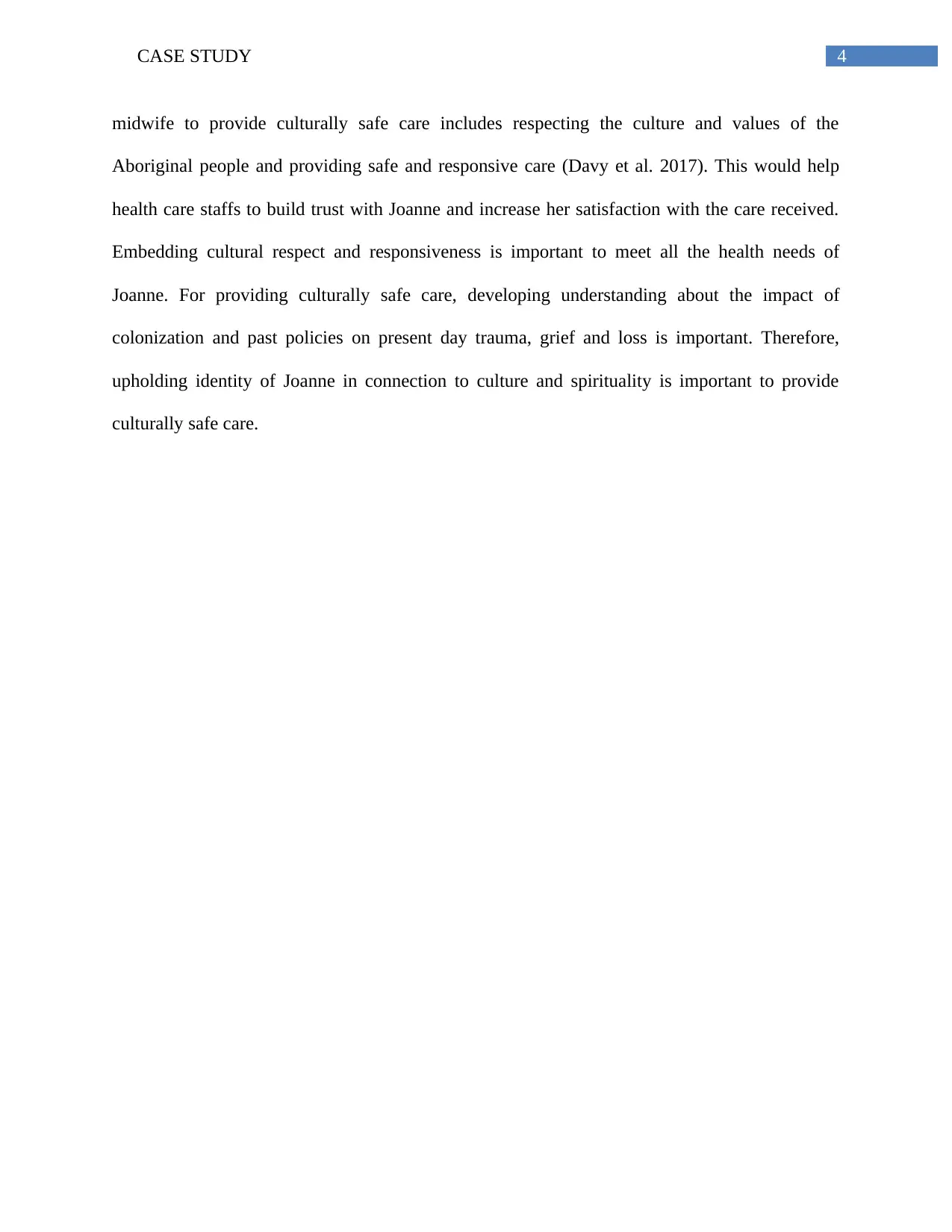
4CASE STUDY
midwife to provide culturally safe care includes respecting the culture and values of the
Aboriginal people and providing safe and responsive care (Davy et al. 2017). This would help
health care staffs to build trust with Joanne and increase her satisfaction with the care received.
Embedding cultural respect and responsiveness is important to meet all the health needs of
Joanne. For providing culturally safe care, developing understanding about the impact of
colonization and past policies on present day trauma, grief and loss is important. Therefore,
upholding identity of Joanne in connection to culture and spirituality is important to provide
culturally safe care.
midwife to provide culturally safe care includes respecting the culture and values of the
Aboriginal people and providing safe and responsive care (Davy et al. 2017). This would help
health care staffs to build trust with Joanne and increase her satisfaction with the care received.
Embedding cultural respect and responsiveness is important to meet all the health needs of
Joanne. For providing culturally safe care, developing understanding about the impact of
colonization and past policies on present day trauma, grief and loss is important. Therefore,
upholding identity of Joanne in connection to culture and spirituality is important to provide
culturally safe care.
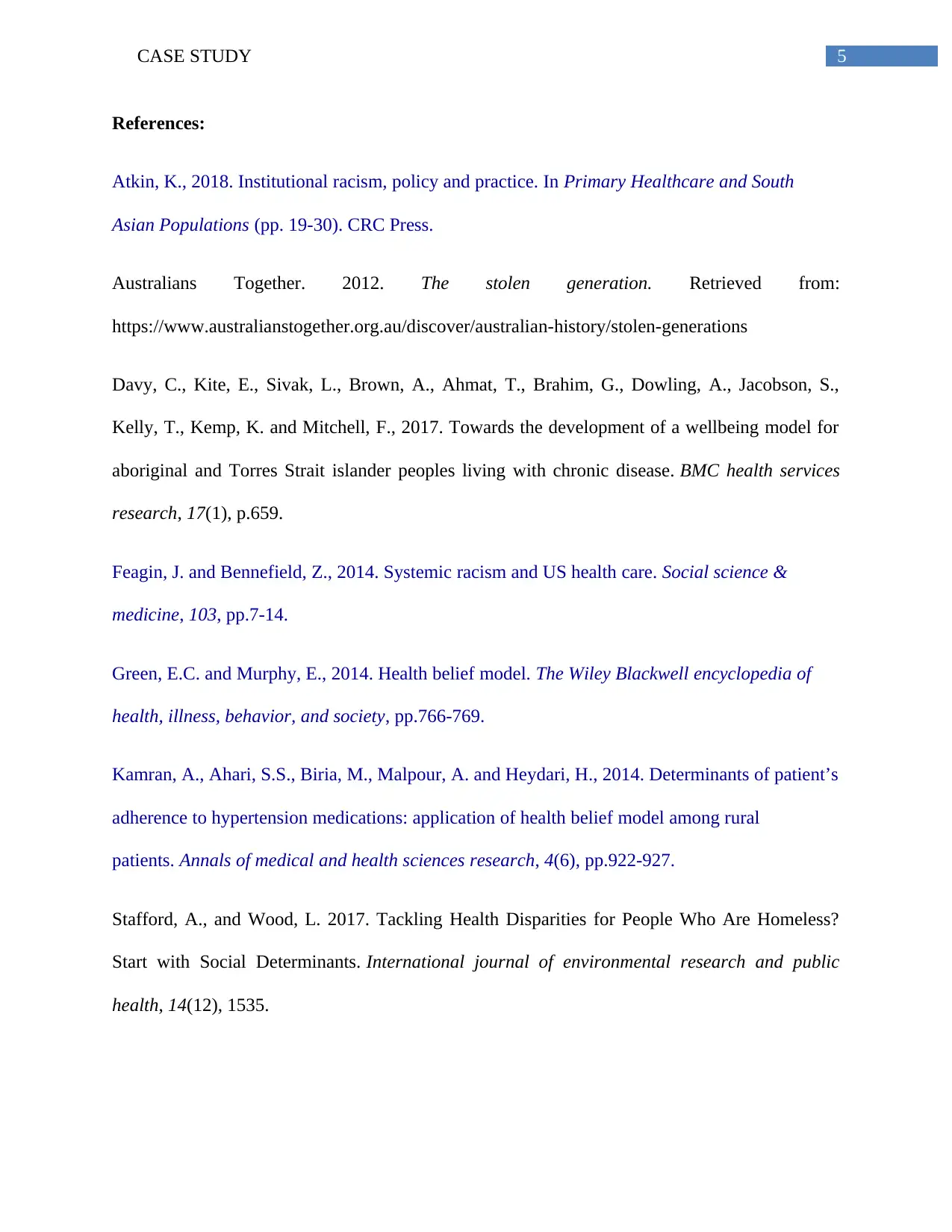
5CASE STUDY
References:
Atkin, K., 2018. Institutional racism, policy and practice. In Primary Healthcare and South
Asian Populations (pp. 19-30). CRC Press.
Australians Together. 2012. The stolen generation. Retrieved from:
https://www.australianstogether.org.au/discover/australian-history/stolen-generations
Davy, C., Kite, E., Sivak, L., Brown, A., Ahmat, T., Brahim, G., Dowling, A., Jacobson, S.,
Kelly, T., Kemp, K. and Mitchell, F., 2017. Towards the development of a wellbeing model for
aboriginal and Torres Strait islander peoples living with chronic disease. BMC health services
research, 17(1), p.659.
Feagin, J. and Bennefield, Z., 2014. Systemic racism and US health care. Social science &
medicine, 103, pp.7-14.
Green, E.C. and Murphy, E., 2014. Health belief model. The Wiley Blackwell encyclopedia of
health, illness, behavior, and society, pp.766-769.
Kamran, A., Ahari, S.S., Biria, M., Malpour, A. and Heydari, H., 2014. Determinants of patient’s
adherence to hypertension medications: application of health belief model among rural
patients. Annals of medical and health sciences research, 4(6), pp.922-927.
Stafford, A., and Wood, L. 2017. Tackling Health Disparities for People Who Are Homeless?
Start with Social Determinants. International journal of environmental research and public
health, 14(12), 1535.
References:
Atkin, K., 2018. Institutional racism, policy and practice. In Primary Healthcare and South
Asian Populations (pp. 19-30). CRC Press.
Australians Together. 2012. The stolen generation. Retrieved from:
https://www.australianstogether.org.au/discover/australian-history/stolen-generations
Davy, C., Kite, E., Sivak, L., Brown, A., Ahmat, T., Brahim, G., Dowling, A., Jacobson, S.,
Kelly, T., Kemp, K. and Mitchell, F., 2017. Towards the development of a wellbeing model for
aboriginal and Torres Strait islander peoples living with chronic disease. BMC health services
research, 17(1), p.659.
Feagin, J. and Bennefield, Z., 2014. Systemic racism and US health care. Social science &
medicine, 103, pp.7-14.
Green, E.C. and Murphy, E., 2014. Health belief model. The Wiley Blackwell encyclopedia of
health, illness, behavior, and society, pp.766-769.
Kamran, A., Ahari, S.S., Biria, M., Malpour, A. and Heydari, H., 2014. Determinants of patient’s
adherence to hypertension medications: application of health belief model among rural
patients. Annals of medical and health sciences research, 4(6), pp.922-927.
Stafford, A., and Wood, L. 2017. Tackling Health Disparities for People Who Are Homeless?
Start with Social Determinants. International journal of environmental research and public
health, 14(12), 1535.
⊘ This is a preview!⊘
Do you want full access?
Subscribe today to unlock all pages.

Trusted by 1+ million students worldwide
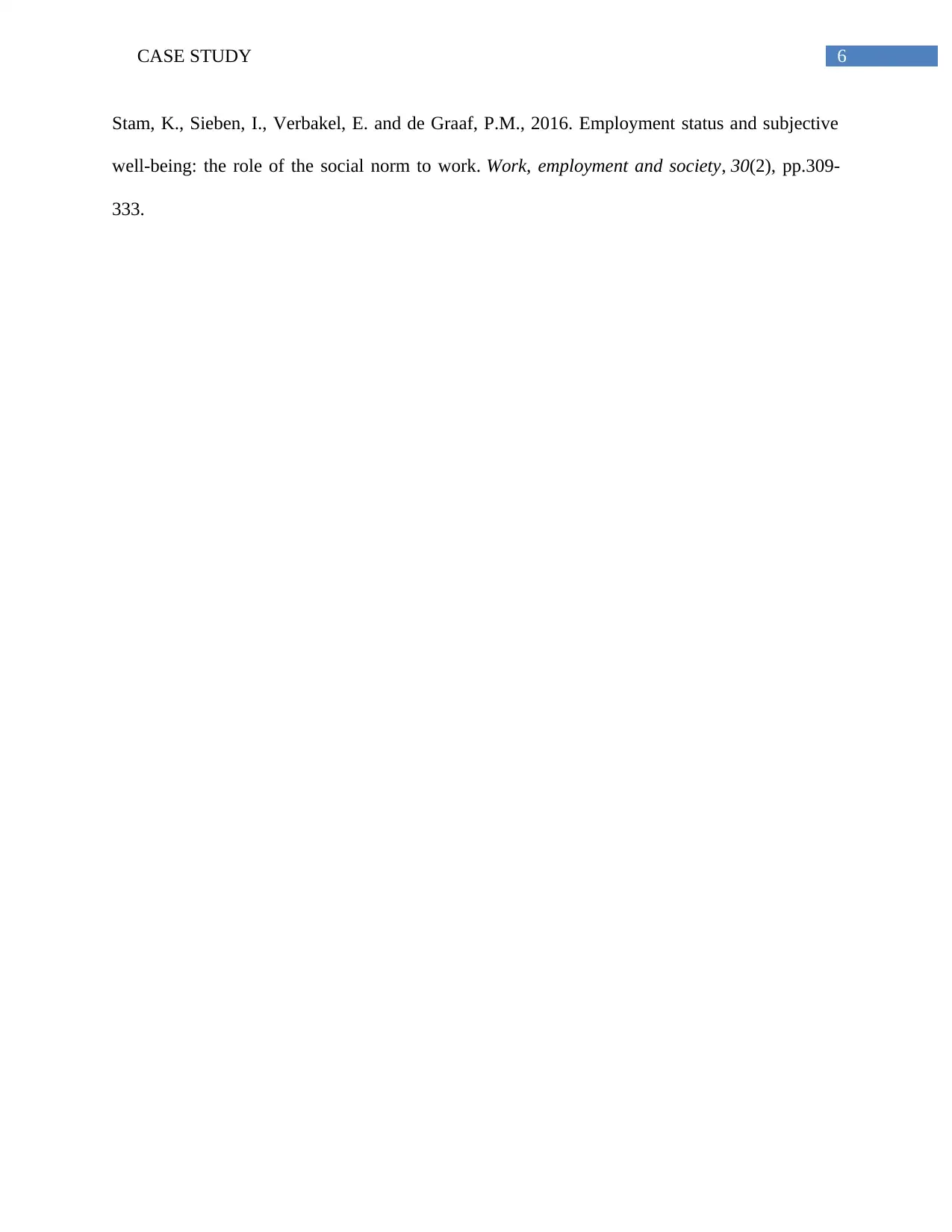
6CASE STUDY
Stam, K., Sieben, I., Verbakel, E. and de Graaf, P.M., 2016. Employment status and subjective
well-being: the role of the social norm to work. Work, employment and society, 30(2), pp.309-
333.
Stam, K., Sieben, I., Verbakel, E. and de Graaf, P.M., 2016. Employment status and subjective
well-being: the role of the social norm to work. Work, employment and society, 30(2), pp.309-
333.
1 out of 7
Related Documents
Your All-in-One AI-Powered Toolkit for Academic Success.
+13062052269
info@desklib.com
Available 24*7 on WhatsApp / Email
![[object Object]](/_next/static/media/star-bottom.7253800d.svg)
Unlock your academic potential
Copyright © 2020–2026 A2Z Services. All Rights Reserved. Developed and managed by ZUCOL.





